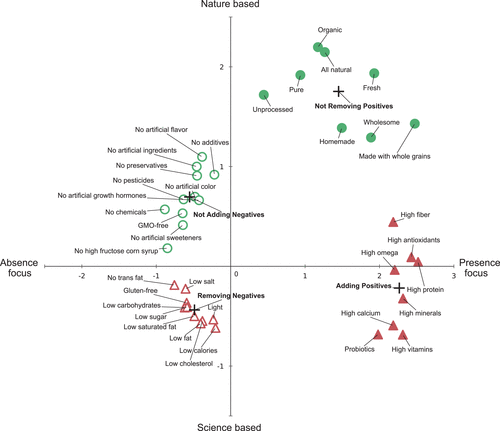A new paper released in the Journal of Public Policy and Marketing provides “a framework for understanding front-of-package food claims” and provides a call to action for regulators. Here’s what it says.

Just how consumers perceive food claims and how these terms influence purchasing decisions is the subject of a report released recently in the Journal of Public Policy and Marketing.
The findings offer a new way to frame how consumers identify front-of-package claims, and also how perceptions of health food might be changing.
Researchers examined how consumers identify front-of-package claims, what benefits (healthiness, tastiness and diet alignment) they associate with the claims and what claims inspire eating goals (hedonic eating, healthy eating and weight maintenance). Then, researchers compared consumer perception with the British Food Standard Agency nutrient profiling score and concluded that perception based upon front-of-package claims and health reality don’t align.
How the claims were broken down. Terms were categorized by their natural or scientific focus and by what a product has or lacks to come up with four categories:
Adding positives; examples include high calcium, probiotics, high vitamins, high protein.
Removing negatives; examples include gluten-free, low salt, low cholesterol, light.
Not adding negatives; examples include no artificial flavor, no preservatives, GMO-free, no pesticides.
Not removing positives; examples are all natural, homemade, pure, fresh.
This chart shows how consumers categorize common claims.
Packaging claims classificiations

What claims mattered to consumers?
For healthfulness: Callouts about science and what’s present in a product resonated as healthier than products that highlighted naturalness or what was not in the packaged food.
For taste: Consumers expect food to taste better when they see nature-focused claims like homemade or no preservatives.
For dieting: Absence-focused and science-based claims (light, low-fat, low calorie or low-sugar) won for diet-focused shoppers. “This result reflects consumers’ belief that the form of the food must match its function: to lose weight, one has to consume food from which certain elements are absent or removed. The intention to lose or maintain weight leads to radically different food choices than the other two consumption goals,” the researchers wrote.
We’ve come a long way, baby: While health food often was associated with poor taste, this research suggests that taste and health inferences are not always negatively correlated.
But the researchers suggest their findings could be a call for possible regulation and certainly for consumer education. “If consumers correctly believe that one type of claim is associated with better nutritional properties, it might become important to regulate it to avoid deceptive practices. However, if consumers associate a higher nutritional quality with a type of claim that is actually displayed on unhealthy food items, it might signal the need for better consumer education in this domain.”
Author Pierre Chandon said in a press release: “This should raise alarm bells for regulators. The first principle of regulating marketing claims is to ensure messages are accurate, but policymakers need to go further. Marketing claims must not only be accurate, they should not be misleading in such a way that consumers expect benefits that a product does not deliver.”
Takeaway: The researchers concluded nature claims “mislead consumers with ideas of health.” The natural products industry must take note of this growing dialogue and be clear in its communications about why such choices matter to people and planet and not abuse the green health halo that natural and "better for you" has in consumers minds.
The researchers:
Pierre Chandon, the L'Oréal Chaired Professor of Marketing, Innovation and Creativity at INSEAD
Quentin André, Assistant Professor of Marketing at Rotterdam School of Management and
Kelly Haws, the Anne Marie and Thomas B. Walker Jr. Professor of Marketing at the Owen Graduate School of Management, Vanderbilt University
Read it for yourself: Journal of Public Policy and Marketing
About the Author(s)
You May Also Like




